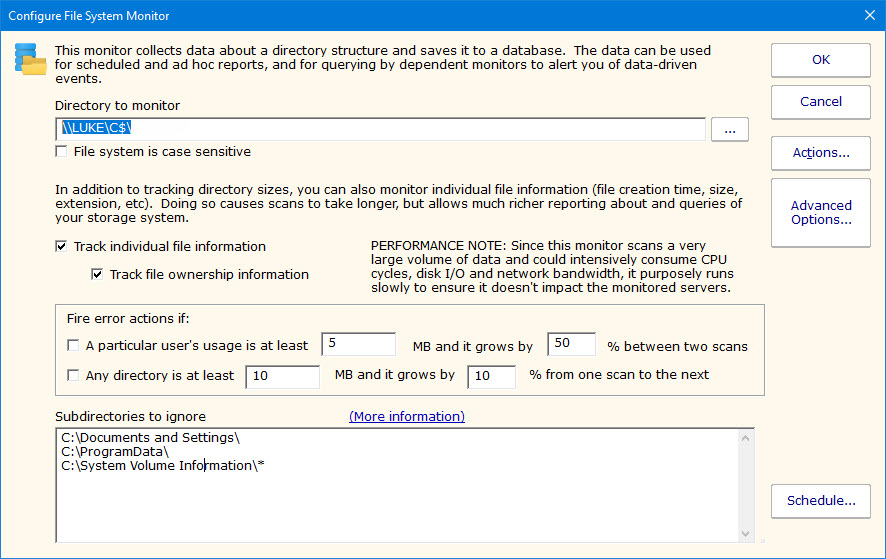- Solutions
-
- File Server: Ransomware Protection
- File Server: File Copy
- File Server: Audit File Access
- File Server: Storage growth reporting
- Licensing/Pricing
- Contact
The File System Analyzer is a very powerful monitor that inspects a volume (local drive, network drive, etc) and records information about each directory, and optionally each file and file owner. Very rich reports are possible including:
The data sets generated by the File System Analyzer can also be consumed by the User Quota monitor.
Configuring the File System Analyzer is as easy as selecting a starting directory and deciding how much information you would like to store in the local database. You can keep multiple data sets.
Scanning an entire file system, especially a large file system over a network can take a considerable amount of CPU, network bandwidth and disk I/O. In order to not impact the performance of the monitored file system server, the File System Analyzer throttles its scans. The trade off is that scans of a very large file system can take a few hours. Typically this isn't a problem because you can create automated reports, and optionally have the report URL emailed to you when the report is ready.

The File System Analyzer has some basic alerting on usage growth, but most users tend to use this monitor almost exclusively for it's reporting power.
Like all monitors, this monitor has standard buttons on the right for Adding Actions, setting Advanced Options and setting the Monitor Schedule.
The power of the File System Analyzer is in its reports. There are a wide variety of report types available.
| Archive Report | Find the folders that can be backed up based on all files and child folders being at least X days old. |
| Custom File Set | A powerful report that will let you specify the types of files that you want to find base on age, file type, file owner, size, etc. |
| Directory Growth | A popular report that shows the size of directories over time, with an optional percent change column between them |
| Duplicate Files | Useful for finding files that have the exact same name, size and date across a volume |
| File Age Distribution | Breaks down the ages of files into days, months and years old. Age is based on Last Accessed, Last Modified or Create Date |
| File Size Distribution | Breaks files into different size categories to help you understand what is being stored |
| File Type Distribution | Useful for finding out what types of files are using the most space on your servers |
| Find Directory Changes | This report will search and find directories that have changed in size. Great for discovering where free disk space has disappeared to. |
| Largest Files | Finds the largest files that have been scanned |
| Largest Files by Owner | Displays the largest files that each person owns (based on file owner property) |
| Largest Storage Users | Shows you who is using the most space on the storage volume (based on file owner property) |
| Database Statistics | General information about how much data and what type is stored in the database |